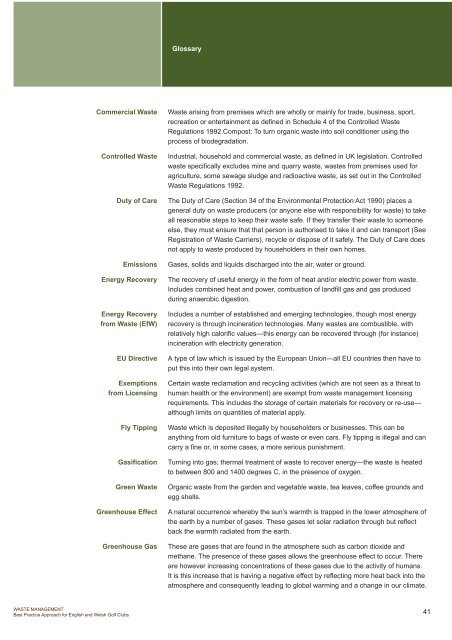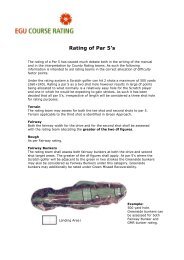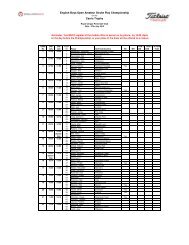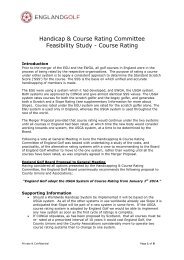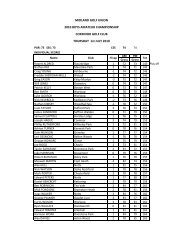Waste management - England Golf
Waste management - England Golf
Waste management - England Golf
Create successful ePaper yourself
Turn your PDF publications into a flip-book with our unique Google optimized e-Paper software.
Glossary<br />
Commercial <strong>Waste</strong><br />
Controlled <strong>Waste</strong><br />
Duty of Care<br />
Emissions<br />
Energy Recovery<br />
Energy Recovery<br />
from <strong>Waste</strong> (EfW)<br />
EU Directive<br />
Exemptions<br />
from Licensing<br />
Fly Tipping<br />
Gasification<br />
Green <strong>Waste</strong><br />
Greenhouse Effect<br />
Greenhouse Gas<br />
<strong>Waste</strong> arising from premises which are wholly or mainly for trade, business, sport,<br />
recreation or entertainment as defined in Schedule 4 of the Controlled <strong>Waste</strong><br />
Regulations 1992.Compost: To turn organic waste into soil conditioner using the<br />
process of biodegradation.<br />
Industrial, household and commercial waste, as defined in UK legislation. Controlled<br />
waste specifically excludes mine and quarry waste, wastes from premises used for<br />
agriculture, some sewage sludge and radioactive waste, as set out in the Controlled<br />
<strong>Waste</strong> Regulations 1992.<br />
The Duty of Care (Section 34 of the Environmental Protection Act 1990) places a<br />
general duty on waste producers (or anyone else with responsibility for waste) to take<br />
all reasonable steps to keep their waste safe. If they transfer their waste to someone<br />
else, they must ensure that that person is authorised to take it and can transport (See<br />
Registration of <strong>Waste</strong> Carriers), recycle or dispose of it safely. The Duty of Care does<br />
not apply to waste produced by householders in their own homes.<br />
Gases, solids and liquids discharged into the air, water or ground.<br />
The recovery of useful energy in the form of heat and/or electric power from waste.<br />
Includes combined heat and power, combustion of landfill gas and gas produced<br />
during anaerobic digestion.<br />
Includes a number of established and emerging technologies, though most energy<br />
recovery is through incineration technologies. Many wastes are combustible, with<br />
relatively high calorific values—this energy can be recovered through (for instance)<br />
incineration with electricity generation.<br />
A type of law which is issued by the European Union—all EU countries then have to<br />
put this into their own legal system.<br />
Certain waste reclamation and recycling activities (which are not seen as a threat to<br />
human health or the environment) are exempt from waste <strong>management</strong> licensing<br />
requirements. This includes the storage of certain materials for recovery or re-use—<br />
although limits on quantities of material apply.<br />
<strong>Waste</strong> which is deposited illegally by householders or businesses. This can be<br />
anything from old furniture to bags of waste or even cars. Fly tipping is illegal and can<br />
carry a fine or, in some cases, a more serious punishment.<br />
Turning into gas; thermal treatment of waste to recover energy—the waste is heated<br />
to between 800 and 1400 degrees C, in the presence of oxygen.<br />
Organic waste from the garden and vegetable waste, tea leaves, coffee grounds and<br />
egg shells.<br />
A natural occurrence whereby the sun’s warmth is trapped in the lower atmosphere of<br />
the earth by a number of gases. These gases let solar radiation through but reflect<br />
back the warmth radiated from the earth.<br />
These are gases that are found in the atmosphere such as carbon dioxide and<br />
methane. The presence of these gases allows the greenhouse effect to occur. There<br />
are however increasing concentrations of these gases due to the activity of humans.<br />
It is this increase that is having a negative effect by reflecting more heat back into the<br />
atmosphere and consequently leading to global warming and a change in our climate.<br />
WASTE MANAGEMENT<br />
Best Practice Approach for English and Welsh <strong>Golf</strong> Clubs<br />
41


